Emotions run high on campus as communities process escalating conflict in Israel and Gaza
Student organizations have held spaces for those affected by recent events.
Student organizations have held spaces for those affected by recent events.

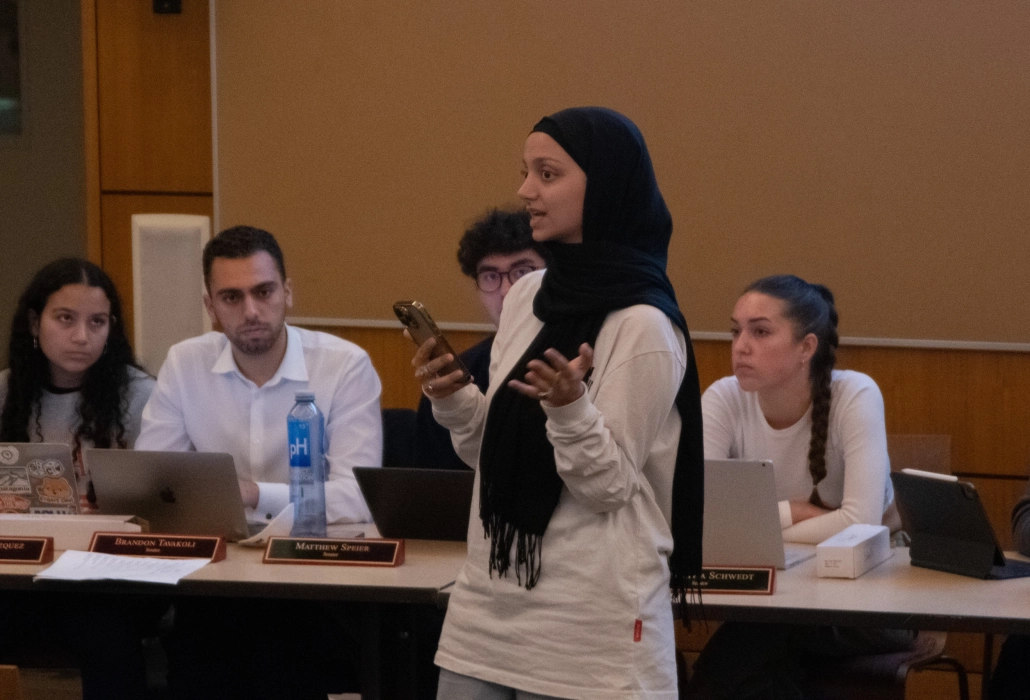

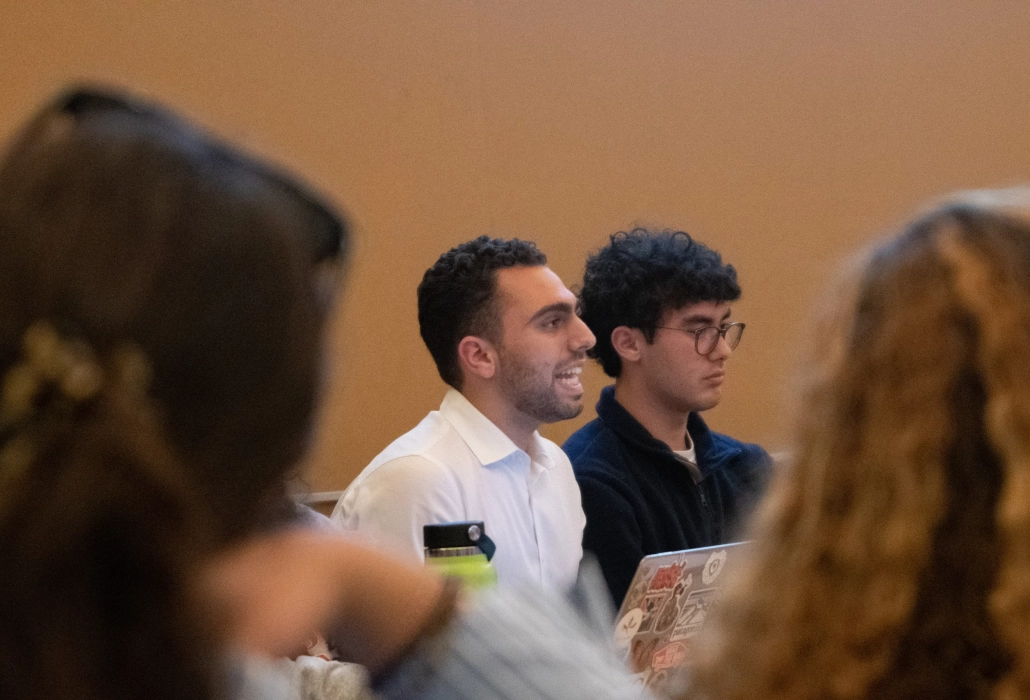
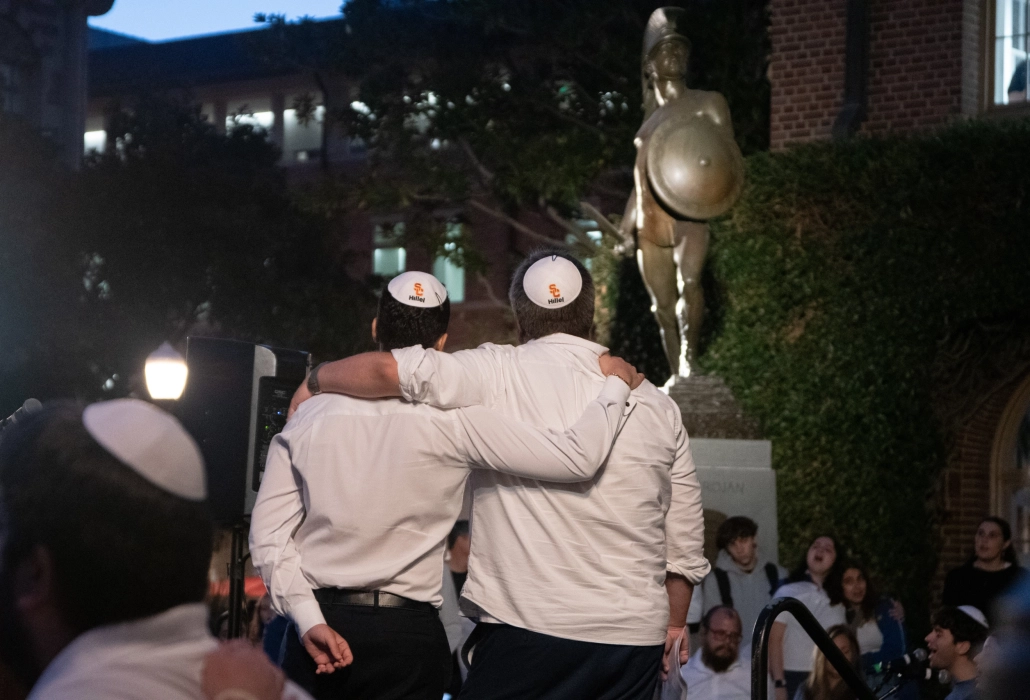
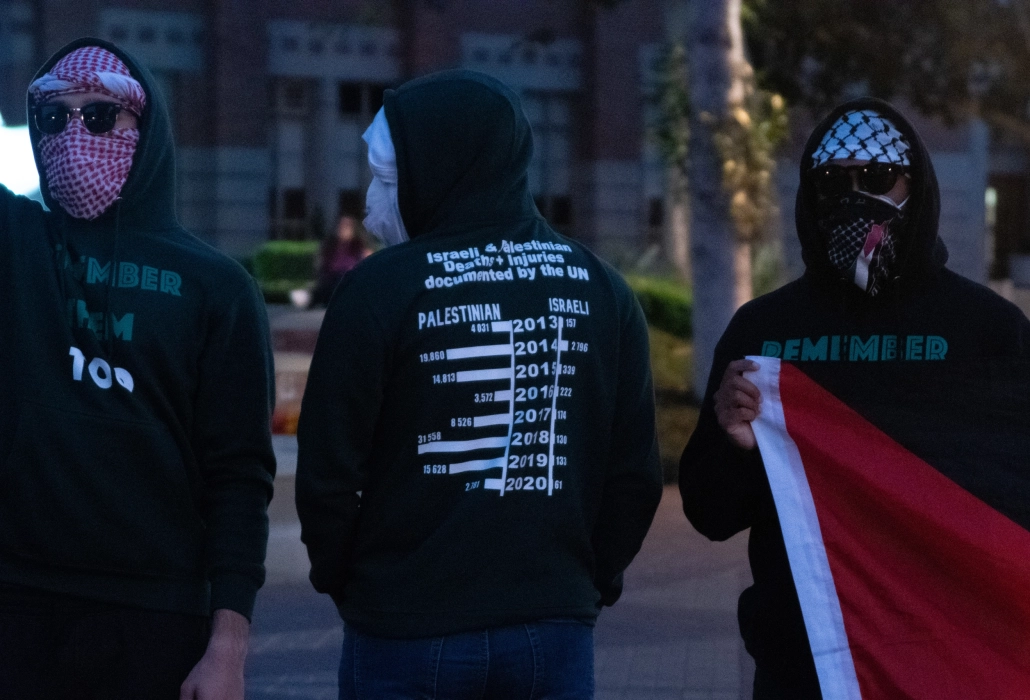
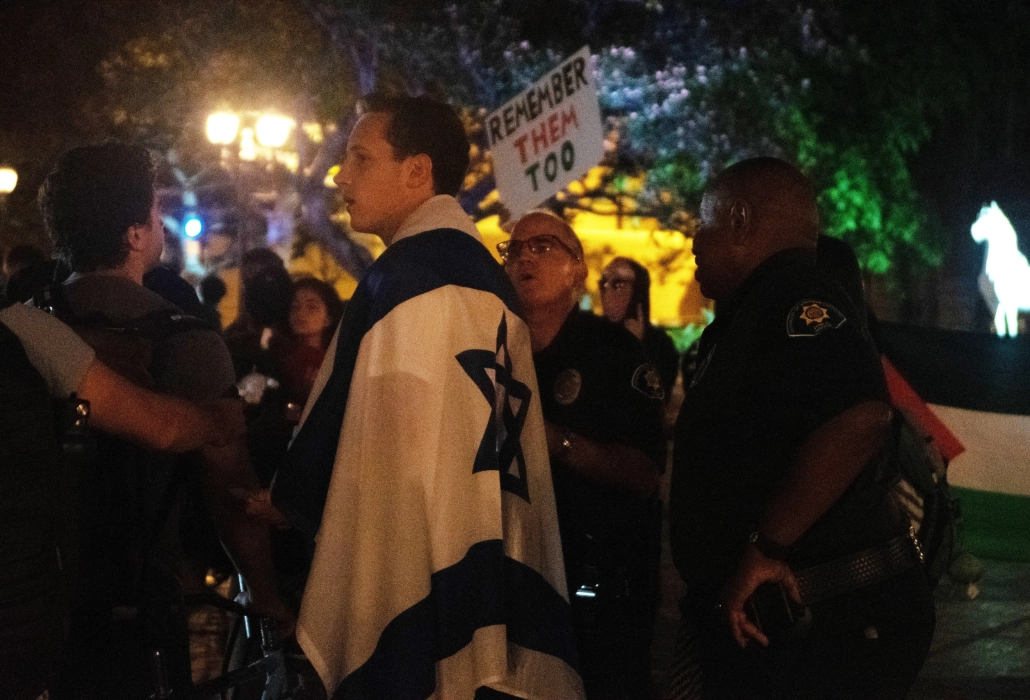
The last four days have marked a period of mourning for several USC communities as Hamas, a Palestinian militant group that is classified by the United States as a terrorist organization, attacked Israel by land, air and sea Saturday morning.
The violence, which is still ongoing, has escalated to a retaliatory Israeli bombing of Gaza, a Hamas-controlled Palestinian territory. The estimated death toll since Saturday was 2,100 at time of publication.
The Middle Eastern North African Student Assembly held a Dabke Night Monday, USC Hillel and USC Chabad led a vigil Tuesday evening and students spoke about the conflict at the Undergraduate Student Government meeting later that night.
On Saturday, Hamas fired thousands of missiles at Israeli cities and crossed the border to attack towns in southern Israel. The Israeli government responded by bombing Gaza. Israeli Prime Minister Benjamin Netanyahu declared his country “at war” the same day.
Since Hamas’ first attack on Saturday, more than 1,200 people have been killed in Israel. The counterattack against Gaza led to 900 people killed in the territory as of Tuesday evening.
Monday evening, approximately 20 MENASA students and allies gathered in the MENA Student Lounge at the Student Union for a vigil and night of Dabke, the national form of Palestinian dance which represents “resistance.” The MENASA executive board planned the event far in advance, and members decided to follow through with it as a symbol of cultural celebration despite devastating loss.
On Tuesday evening, approximately 150 people attended a Jewish Trojan Family Solidarity Vigil. Many Jewish students wearing yarmulkes were in attendance at Tommy Trojan. Passersby also stopped and listened to speakers who shared their emotions surrounding the most recent escalation in Israel and Gaza.
Dave Cohn, the executive director of Hillel, started by calling for “an atmosphere of mutual support” and clarifying the intentions of the vigil.
“This is a familiar place to most of us and hopefully a home,” Cohn said. “It holds game day celebrations and graduations, convocations and concerts. But today it is a house of mourning.”
For others, USC feels far from a home — and they are hesitant to speak out, fearing for their lives and the lives of their loved ones.
“Coming into USC, I was really afraid to say I was Palestinian — way more than I was growing up,” a student said in an interview with the Daily Trojan.
“Even my family warns to not make it too known, because there are risks that come from it if you speak out,” the student said. “In Palestine, they keep a record of your house, if you’re Palestinian … and my family back home is in danger because they’re under occupation.”
The student, who wished to stay anonymous for safety reasons, said that their cousin, who attends USC, received death threats for speaking out.
Others, like President Carol Folt in her original statement Sunday, were criticized by commenters on Instagram as “weak” for failing to name Hamas and Palestine. In a new statement two days later, she wrote, “We condemn the terrorist attacks by Hamas and their brutal threats to execute kidnapped civilians and commit other atrocities.”

The attacks on Israel and Gaza are the latest developments in a 75-year conflict between the State of Israel and Palestine over the rightful claim to Jerusalem and the surrounding area. Since the declaration of Israel’s independence in May 1948, thousands of Israelis and Palestinians have died over the course of multiple wars.
Hamas’ attack comes 50 years after the start of the Yom Kippur War, which began with a surprise attack against Israel Oct. 6, 1973 on the Jewish holiday of the same name. The 1973 war was staged by numerous Arab countries, including Egypt and Syria. Israeli losses totaled 2,656 lives.
In 2022, 146 Palestinians were killed by Israeli forces, the highest death toll since the United Nations began keeping records of casualties in 2005. Though Israel formally relinquished control over Gaza the same year, it maintains tight control over the region’s borders along with Egypt.
On Monday, the governments of France, Germany, Italy, the United Kingdom and the U.S. released a statement expressing “steadfast and united support” to Israel and “unequivocal condemnation of Hamas.”
There was a set list of speakers at Tuesday’s vigil representing a broad range of Jewish-oriented organizations, including USC Chabad and Trojans for Israel. Among the many personal experiences and emotions that were shared, one of the speakers said that a “shared pain” and “a raw, unfiltered empathy” brought a “profound sense of solidarity with my Jewish friends.”
In addition to speakers from Jewish-oriented organizations, the vigil included Hebrew prayers for the state of Israel and a reflection on the Torah from Chabad Rabbi Dov Wagner.
“This is not some distant, faraway thing. This is happening right here,” said Maya Grinstein, the president and Israel cabinet chair of Hillel. “Israel lives in my heart. Israel lives in my spirit, and by looking at everyone who is here today, I know Israel lives here.”
Off to the side, a few people stood silently and carried a Palestinian flag. They stood to show both sides of their hoodies that read “REMEMBER THEM TOO” on one side and a graph showing the number of Palestinian deaths versus Israeli deaths over the past decade of the conflict on the other.
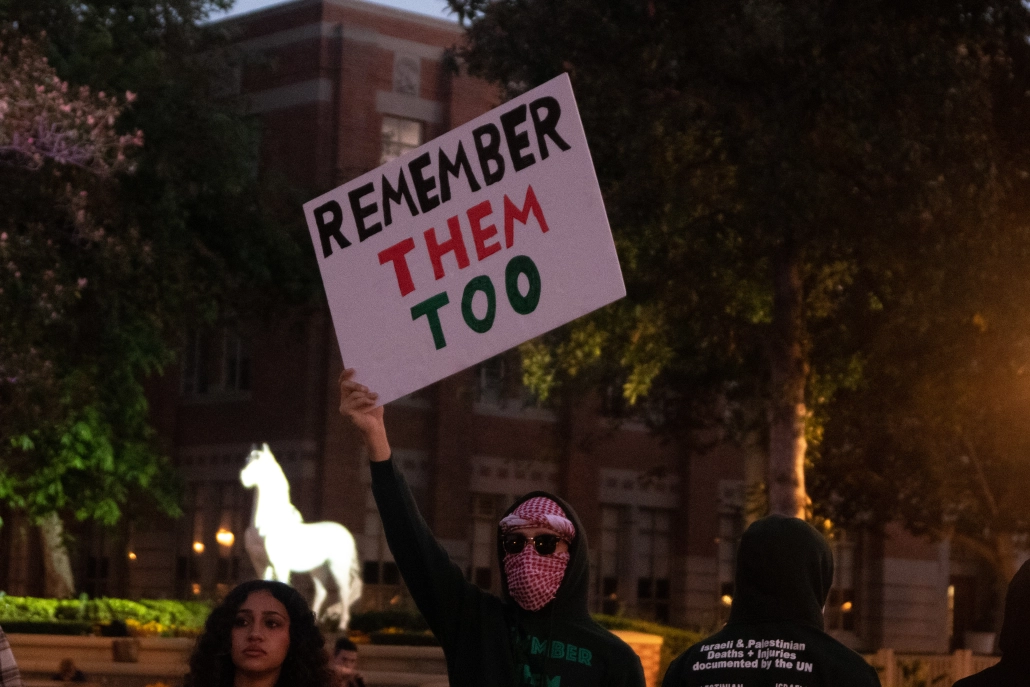
They wore balaclavas, a form of headcloth exposing only a small part of the face, and sunglasses to maintain anonymity — one of the students expressed that they or their families could face retribution if they spoke out.
Students also expressed fear about surveillance and doxxing on North American college campuses by Canary Mission, an organization that lists and publishes personal information about organizations and individuals who “promote hatred of the USA, Israel and Jews.” Erwin Chermerinsky — dean of the Berkeley Law School — wrote that it had “the grave effect of chilling speech.”
After the vigil, some students gathered around the masked individuals who stayed silent, making directed comments toward them such as, “Hey, COVID’s over, you can take the masks off,” and “pieces of shit.” A line of around eight to 10 Department of Public Safety officers stood between the demonstrators and the other vigil participants until the gathering died down.
USG senator Brandon Tavakoli, a speaker at the event, wrote a letter intending to present it at the USG meeting later Tuesday night that would reproach an initial statement MENASA released on its Instagram Monday afternoon, addressing the developing situation. In response, MENASA released an updated statement that acknowledged the effect of the conflict on both Palestinians and Israelis, as the original statement had been criticized for focusing on the West Bank and Gaza.
At the USG meeting, students and senators discussed the conflict in the region and responses on campus. Despite being unable to read Tavakoli’s statement because of procedural rules related to quorum, senator Tavakoli and students from MENASA spoke about the latter’s statement.
Tavakoli took particular issue with the omission of Israel in a MENASA statement that read, “We represent a region encompassing the West Bank and Gaza and we would like to acknowledge the great impact this has on the students MENASA represents.”
Though discussion grew heated at times, both Tavakoli and MENASA acknowledged the need for collaboration.
“I really hope people will understand that we are committed to cultural inclusivity, and we are working on initiatives for students,” a MENASA representative said. “I’ve heard from a lot of friends on both sides. Both sides have midterms this week. They’re unsure about where their families are.”
We are the only independent newspaper here at USC, run at every level by students. That means we aren’t tied down by any other interests but those of readers like you: the students, faculty, staff and South Central residents that together make up the USC community.
Independence is a double-edged sword: We have a unique lens into the University’s actions and policies, and can hold powerful figures accountable when others cannot. But that also means our budget is severely limited. We’re already spread thin as we compensate the writers, photographers, artists, designers and editors whose incredible work you see in our daily paper; as we work to revamp and expand our digital presence, we now have additional staff making podcasts, videos, webpages, our first ever magazine and social media content, who are at risk of being unable to receive the compensation they deserve.
We are therefore indebted to readers like you, who, by supporting us, help keep our paper daily (we are the only remaining college paper on the West Coast that prints every single weekday), independent, free and widely accessible.
Please consider supporting us. Even $1 goes a long way in supporting our work; if you are able, you can also support us with monthly, or even annual, donations. Thank you.
This site uses cookies. By continuing to browse the site, you are agreeing to our use of cookies.
Accept settingsDo Not AcceptWe may request cookies to be set on your device. We use cookies to let us know when you visit our websites, how you interact with us, to enrich your user experience, and to customize your relationship with our website.
Click on the different category headings to find out more. You can also change some of your preferences. Note that blocking some types of cookies may impact your experience on our websites and the services we are able to offer.
These cookies are strictly necessary to provide you with services available through our website and to use some of its features.
Because these cookies are strictly necessary to deliver the website, refusing them will have impact how our site functions. You always can block or delete cookies by changing your browser settings and force blocking all cookies on this website. But this will always prompt you to accept/refuse cookies when revisiting our site.
We fully respect if you want to refuse cookies but to avoid asking you again and again kindly allow us to store a cookie for that. You are free to opt out any time or opt in for other cookies to get a better experience. If you refuse cookies we will remove all set cookies in our domain.
We provide you with a list of stored cookies on your computer in our domain so you can check what we stored. Due to security reasons we are not able to show or modify cookies from other domains. You can check these in your browser security settings.
These cookies collect information that is used either in aggregate form to help us understand how our website is being used or how effective our marketing campaigns are, or to help us customize our website and application for you in order to enhance your experience.
If you do not want that we track your visit to our site you can disable tracking in your browser here:
We also use different external services like Google Webfonts, Google Maps, and external Video providers. Since these providers may collect personal data like your IP address we allow you to block them here. Please be aware that this might heavily reduce the functionality and appearance of our site. Changes will take effect once you reload the page.
Google Webfont Settings:
Google Map Settings:
Google reCaptcha Settings:
Vimeo and Youtube video embeds:
The following cookies are also needed - You can choose if you want to allow them:
